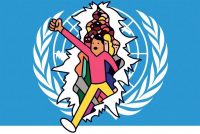
Pardon Edward Snowden
Edward J. Snowden, the American who has probably left the biggest mark on public policy debates during the Obama years, is today an outlaw. Mr. Snowden, a former National Security Agency contractor who disclosed to journalists secret documents detailing the United States’ mass surveillance programs, faces potential espionage charges, even though the president has acknowledged the important public debate his revelations provoked.
Mr. Snowden’s whistle-blowing prompted reactions across the government. Courts found the government wrong to use Section 215 of the Patriot Act to justify mass phone data collection. Congress replaced that law with the USA Freedom Act, improving transparency about government surveillance and limiting government power to collect certain records.… Seguir leyendo »



